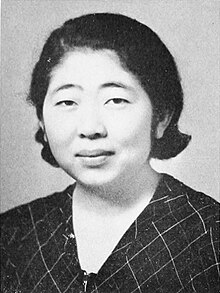Yoko Matsuoka | |
|---|---|
| 松岡洋子 | |
 Matsuoka, 1939 | |
| Born | 20 April 1916 Tokyo, Japan |
| Died | 7 December 1979 (aged 63) Tokyo, Japan |
| Occupation(s) | journalist, writer, translator, literary agent, activist |
| Years active | 1937–1978 |
Yoko Matsuoka (Japanese: 松岡洋子 20 April 1916 – 7 December 1979) was a Japanese writer, literary agent, translator, and anti-war and women's rights activist. She was born in Tokyo and was educated in Japan and Korea before being sent to study in the United States in 1931, as a protest to the Asian Exclusion Act. She graduated from Shaker Heights High School in Cleveland, Ohio, in 1935 and earned a degree in political science from Swarthmore College in Pennsylvania in 1939. During her schooling, she became interested in international relations and was active in organizations which promoted peace and friendship. In the interwar era, she was active in the Pan-Pacific Women's Association and attended several youth conferences aimed at developing international cooperation. On her way home to Japan when World War II began, she began to examine the criticism leveled at Japan's militaristic policies.
During the war, Matsuoka worked at the International Cultural Association and then lectured at the Kokoumin-Seikatasu-Gakuin girls' school. Near the end of the war, she became an editor at the Japanese office of Reader's Digest and began working as an interpreter and translator for foreign correspondents, including Keyes Beech and Edgar Snow. Becoming a journalist and literary agent, she was disillusioned with policymakers and became openly critical of both the United States and Japan for their militarism. Matsuoka was a founding member of the Fujin Minshū Kurabu (Women's Democratic Association). She was elected as its first president in 1946 and served as editor-in-chief of the club's media organ, The Democratic Women's News. The club members actively opposed militarism and fought for socio-economic parity for women. The following year, she also became president of the women's auxiliary of the Japan Socialist Party. When her leftist associations began to impact her ability to publish, Matsuoka returned to the United States and completed graduate studies in foreign relations at Swarthmore and then at the Fletcher School of Law and Diplomacy between 1949 and 1952. In her last year in the US, she published her autobiography, Daughter of the Pacific.
Matsuoka served as an interpreter for Eleanor Roosevelt when she visited Japan in 1953. As a journalist and activist, Matsuoka visited more than twenty countries urging internationalist and anti-war policies. She translated many works of other writers and in 1956, she became secretary general of the Japan PEN Club. She was the permanent director of the Japan-China Friendship Association and was active in the fight to normalize diplomatic relations with China. She was an outspoken critic of the Cold War superpowers' interventionist and militaristic policies. She opposed the separation of North and South Korea, as well as North and South Vietnam and pressed for reunification. Matsuoka worked with women's groups to create pan-Asian solidarity and closer alliances between Japan and nations in the Global South. She was a prominent activist in the Women's Liberation Movement in Japan, known as ūman ribu, until her death in 1979.
© MMXXIII Rich X Search. We shall prevail. All rights reserved. Rich X Search
